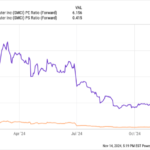
In 2016, after serving 13 years in prison, Weldon Angelos, an accomplished producer who collaborated with renowned artists like Snoop Dogg and 2Pac, was released following President Obama’s commutation, backed by Senators Cory Booker, Mike Lee, Rand Paul, prison reform advocate Alice Johnson and Charles Koch.
This milestone led to a significant turning point in 2020 with President Trump’s pardon, concluding his legal battles. Post-release, Angelos established The Weldon Project in Los Angeles, advocating for nonviolent drug offenders. Companies like Kush Co. GNLN, Cresco CRLBF and others support his advocacy work today.
In an exclusive interview with Benzinga Cannabis, Angelos spoke about the War on Drugs, its impact on families, the younger generation, the Project Mission Green, and the Weldon Project.
“The investigation into my activities was largely based on my involvement in the so-called ‘gangsta rap’ music scene during the ‘hip-hop police’ era when state and federal authorities aggressively targeted rappers and rap moguls,” Angelos told Benzinga.
Hip-Hop, Race, And The War On Drugs
Angelos’ story was deeply intertwined with the era’s attitudes towards hip-hop and race, reflecting how authorities perceived rap music and artists as inherently linked to violence and crime. “Prosecutors decided to make an example out of me and spent the trial scaring the jury about rap music,” Angelos said.
“I started out working with Snoop Dogg’s Dogg Pound group and 2Pac’s rap group the Outlawz’ along with Bay Area legend Mac Dre. I eventually ended up in Snoop’s house making an album entitled ‘We From the LBC,’ which helped me land a record deal,” Angelos shared.
Meanwhile, a Utah drug task force suspected Angelos’ rap connections involved criminal activities.
“I was also selling cannabis on the side to take care of my two young sons. Cannabis was also the culture. The government sent a confidential informant to purchase cannabis. I was no longer selling cannabis and gave him roughly $300 three times. I was arrested 6 months later,” Angelos continued.
“They found two legal firearms in a locked safe. Because I wasn’t willing to implicate rap artists or take an unjust plea deal, the government added 16 additional charges and I was facing 105 years of mandatory imprisonment.”
The Ripple Effects Of Long Sentences
Angelos highlighted the devastating impact of prolonged sentences, particularly how they disrupt families, with children suffering the most. This separation often leads to financial issues, emotional distress, and negative impacts on children’s development and well-being, according to Angelos.
Angelos also pointed out, that post-release, the noxious effects of lost productivity and employment barriers further entrench the cycle of poverty and disadvantage.
Advocating For Change: The Weldon Project And Project Mission Green
Despite some progress, including a pardon for simple marijuana possession, Angelos emphasizes the need for law and sentencing reform, especially as marijuana legislation evolves.
“The Weldon Project is working to reform cannabis laws at the federal and state level. It’s also working with governors and the White House to ensure that as many people as possible are released from prison and those who have been released from prison can get their records expunged so that they may have a meaningful second chance,” Angelos said.
In addition, Angelos established Project Mission Green, the first initiative focused on securing presidential clemency for those jailed for cannabis.
“Working with recent presidential administrations, including Biden’s, we’ve pushed for comprehensive clemency. In 2021, I submitted a letter to President Biden, endorsed by Drake, Killer Mike, Deion Sanders and other officials, advocating for clemency for cannabis offenders,” Angelos noted.
“This was followed by discussions in 2022 with White House advisors and a symposium involving legal authorities to establish criteria for commuting sentences of federal cannabis offenders.”
“This is especially important given the likelihood that cannabis will be rescheduled to a Schedule 3 without any direct benefit to those who have been harmed by cannabis prohibition. Since rescheduling will not directly lower the federal penalties for cannabis felonies, we are working to get the U.S. Sentencing Commission to lower the Federal Sentencing Guidelines for marijuana offenses and make the changes retroactive,” Angelos concluded.
Voices From Behind Bars
He drew attention to cases like Jerry Haymon IV and Jimmy Cournoyer, both serving excessive sentences for non-violent cannabis offenses.
Their stories, according to Angelos, exemplify the disproportionate impact of the war on drugs on people of color and those from less privileged backgrounds.
Benzinga Cannabis Conferences are coming to Los Angeles. Join the Benzinga Cannabis Market Spotlight: California, and unlock the future of cannabis at the premier networking event in Culver City on February 22. Connect with top industry leaders, gain insider insights into the investment landscape, and shape the evolving markets in California and beyond. Don’t miss this chance to be at the forefront of the cannabis industry’s growth and innovation! Join now.
Photo: Courtesy of The Weldon Project.





